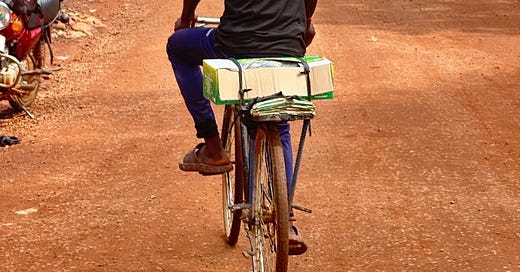Lately, I’ve been reflecting on the base of the pyramid—omuntu wa wansi, the everyday Ugandan, often ignored in business strategy yet holding immense potential.
Today, during my routine walk, a man on a bicycle rode past shouting, “Sabuuni omutti gwa nkuumi nya, haafu ya bbiri…” (Soap at 4,000 a bar, 2,000 for half…). That moment crystallized what I’ve been thinking—it’s time we had this conversation.
Instead of letting stock gather dust in shops, some entrepreneurs are deploying foot soldiers and cyclists to push products into residential areas in smaller, more affordable formats. This is a smart response to economic realities. I might not afford a full bar of soap, but a half? That’s within reach.
Small Formats, Big Opportunity
Take DSTV. After years of rigid monthly subscriptions, they finally introduced weekly options. But why wait for competition to force your hand? The signs have always been clear: the base of the pyramid demands flexibility.
Ignore omuntu wa wansi at your peril. That’s where the volumes are. And more importantly, that’s where stability lies. Uganda’s middle class is thin and extremely fluid—like the waist of an hourglass. Someone may be middle class in January and back to muntu wa wansi in February. Why? Because our economy runs on deals and inconsistencies. One week it’s facilitation for a field trip, the next it’s financial drought.
Our middle class drives fancy cars, often from NGOs or government bodies (motooka zza kitongole), yet can’t afford proper housing. They buy sacks of charcoal and employ domestic workers without contracts, paying UGX 100k or 150k per month. They straddle a precarious line between comfort and struggle.
The Secret Sauce: 3As
Successful businesses understand the 3As of the Base of the Pyramid (B.O.P): Affordability, Accessibility, and Availability. You must make products or services reachable, usable, and pocket-friendly.
That’s why sachets work. Someone might not afford a litre of cooking oil, but they can buy 250ml. Or 100g of curry powder. Or a piece of charcoal. That’s how distribution meets need.
Why has the ka-small retail shop survived despite malls and supermarkets? Because it breaks bulk and offers interest-free credit. Where else can you buy two kilograms of cement or borrow a matchbox?
Innovations Born from Necessity
When Goodwill Tiles entered the market, they didn’t target the elite. They offered affordable tiles, enabling many to upgrade from cement floors. The same with Equity Bank. Before it came, the only banker of muntu wa wansi was a mattress. Equity said, “Come as you are.” Their banking halls were unpretentious. Farmers, boda riders, vendors all felt at home.
Bukedde TV and Bukedde newspaper dominated because they served the masses in their language, with relatable content.
In Kampala, hotels now charge for short stays. Why leave a room empty when Mutyaba needs a lunch break? Pragmatism is now the economy.
Microtransactions, Macro Impact
People are monetizing Wi-Fi by redistributing it at a fee. You pay UGX 1k or 2k for daily access. In betting, even the Askari can place his busure. In real estate, a friend is using the Densification Model—12 units on one plot in Nansana or Kireka, each at UGX 300k. Always occupied. Always cash flowing.
This is the logic behind Uber ChapChap in Kenya—smaller, fuel-efficient, cheaper. It’s why local food vendors on Glovo don’t bother with elaborate branding—just give good food at a fair price. The logo doesn’t matter; taste and cost do.
Uganda: A Cash and Credit Economy
In Uganda, we still pay salaries and school fees in bitundu (installments). Most people have some form of informal credit—the maid waiting for last month’s salary, the landlady waiting for rent to pay builders. Ours is not a cash economy, but a credit one.
So, as a business, you must innovate not just what you sell, but how, where, and to whom you sell it.
Go Where Others Don’t
Traffic vendors introduced new distribution channels. Your product doesn’t need a shelf in a supermarket—it needs visibility in a jam. That’s what innovation looks like on the streets.
Clothes rental became popular because people couldn’t afford to buy wedding suits and gowns. Why sell when you can rent and earn multiple times?
Delident once gave Colgate a scare with affordable toothpaste sachets. Riham Cola made Coca-Cola rethink its strategy with its mini bottles. Even the mighty must bend when the base moves.
Embrace the Base
If your product or service is adopted by the base, you’ve achieved something significant. In Kenya, even the Smokie guy has an M-Pesa Paybill. In Uganda, it’s still cash, so withdrawal fees matter. But if you want scale, you must make your product digital, divisible, and distributed.
Want your business to grow in Uganda? Don’t build for the elite. Build for the base. Unless you're B2B, the mass market is your market.
Let’s not forget—omuntu wa wansi is the soul of our economy. They deserve better. And businesses that serve them well? They don’t just survive. They thrive.
So refine your product. Rethink your pricing. Reimagine your distribution. Break bulk. Remove the unnecessary. Sweep the money off the floor.
Omuntu wa wansi is not just a target. They are the market.
And maybe this article itself? Let's translate it into Luganda, Runyankole, Luo, and more using AI. Voice it for TikTok. Get it in the ears of the people it’s about.
Because in the end, relevance is the new marketing
.




